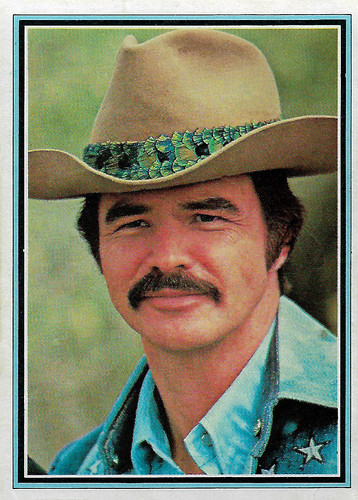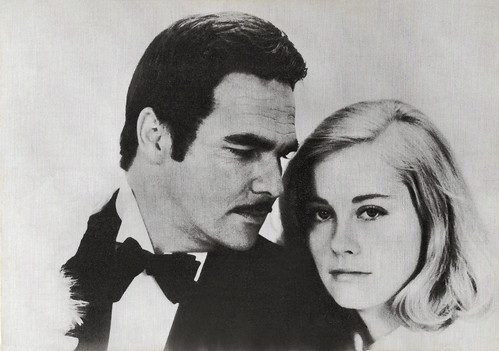
Spanish collectors card in the Telestars series by Ediciones Este, Barcelona, no. 198. Burt Reynolds in Hooper (Hal Needham, 1978).

American postcard by Coral-Lee, Rancho Cordova, CA, no. Personality # 81, SC176971063. Photo: Steve Schapiro / Sygma.
A canoe trip that turns into a nightmare
Burton Leon 'Burt' Reynolds was born in Lansing, Michigan, in 1936. His parents were Burton Milo Reynolds), and Harriette Fernette 'Fern' Reynolds née Miller. His paternal grandmother was Cherokee. After World War II, his family moved to Riviera Beach, Florida, where his father was chief of police. In his youth, Reynolds was an American football talent. After a serious injury, he switched to school drama and in 1956 he won the Florida State Drama Award. Reynolds won an acting scholarship to the Hyde Park Playhouse, a summer stock theatre, in Hyde Park, New York, and moved to New York.
He made his Broadway debut in the play 'Look, We've Come Through'. He gained a part in a revival of 'Mister Roberts', in which Charlton Heston played the starring role. Reynolds' first big break came when he was cast alongside Darren McGavin in the lead of the TV series Riverboat (1959), playing Ben Frazer. He quit Riverboat after only 20 episodes, claiming he did not get along with Darren McGavin and the executive producer, and that he had "a stupid part".
Reynolds made his feature film debut in the low-budget drama Angel Baby (Paul Wendkos, 1961) starring Salome Jens, George Hamilton and Mercedes McCambridge. From 1962 to 1965, he played "halfbreed" blacksmith Quint Aspen in the series Gunsmoke. He was cast in his first lead role in a film, the low-budget action film, Operation C.I.A. (Christian Nyby, 1965). Reynolds was given the title role in a TV series, Hawk (1966–1967), playing Native American detective John Hawk. It ran for 17 episodes before being cancelled. Reynolds appeared in numerous TV roles until the early 1970s.
Reynolds had leading roles in such films as the Spaghetti Western Navajo Joe (Sergio Corbucci, 1966), the Mexican-American action film Shark! (Samuel Fuller, 1969), the Western comedy Sam Whiskey (Arnold Laven, 1969) with Angie Dickinson, and the Western 100 Rifles (Tom Gries, 1969) with Jim Brown and Raquel Welch. His role as Lewis Medlock opposite Jon Voight in Deliverance (John Boorman, 1972) finally made Burt Reynolds a bonafide star. Boorman's gritty action drama, in which a group of adventurous city slickers go on a canoe trip that turns into a nightmare, became a classic and is generally considered Reynolds' best film. That year, a nude photo in Cosmopolitan also contributed greatly to his rapidly rising popularity. Reynolds lay casually on a bearskin and covered his more intimate body parts with his left arm. The photo is considered to be the first centrefold of a naked man, which became known worldwide and caused the number of his admirers to skyrocket. The issue sold 1.5 million copies. He later said that he deeply regretted posing for the photo, as he believed it lost him an Academy Award nomination for Deliverance (1972), as he would not be seen as a 'serious actor'.
Reynolds was considered for the role of James Bond. He turned down the role, believing that an American couldn't play the role. As a charming and quick-witted talk show guest on American television, Reynolds consolidated his fame and became a sex symbol and top star. He starred in a number of subsequent box office hits, such as Shamus (Buzz Kulik, 1973), White Lightning (Joseph Sargent, 1973) and The Longest Yard (Robert Aldrich, 1974). He also made a cameo in the Woody Allen film, Everything You Always Wanted to Know About Sex* (*But Were Afraid to Ask) (1972). Reynolds then appeared in two big-budget fiascos: the musical At Long Last Love (Peter Bogdanovich, 1975) with Cybill Shepherd, and Lucky Lady (Stanley Donen, 1975) with Gene Hackman and Liza Minnelli.

Spanish postcard by Bergas Industrias Gráficas, no. 1063. Photo: Vedettes Enr., Charlesbourg, Canada.

French postcard by Humour a la Carte, Paris, no. ST-149.
The image of the self-deprecating adventurer and modern outlaw
The late 1970s and early 1980s saw many successes for Burt Reynolds, especially as 'Bandit' in Smokey and the Bandit (Hal Needham, 1977) with Jerry Reed and Sally Field, Semi-Tough (Michael Ritchie, 1977), Hooper (Hal Needham, 1978), Smokey and the Bandit II (Hal Needham, 1980), The Cannonball Run (Hal Needham, 1981) with Roger Moore and Farrah Fawcett, Sharky's Machine (Burt Reynolds, 1981), The Best Little Whorehouse in Texas (Colin Higgins, 1982) with Dolly Parton, and Cannonball Run II (Hal Needham, 1984).
With these artistically rather undemanding action comedies, in which Reynolds cultivated the image of the self-deprecating adventurer and modern outlaw, Reynolds established himself as one of the most attractive and - with four to five million dollars per film - best-paid stars of his time. Reynolds was voted the world's number one box-office star for five consecutive years (1978–1982) in the annual Top Ten Money Making Stars Poll.
The moustachioed actor made a cameo appearance in Mel Brooks' silent comedy Silent Movie (1976), parodying himself as a vain superstar. However, his image became so entrenched that audiences did not accept him as a performer in more ambitious films such as the black comedy The End (Burt Reynolds, 1978) and the relationship comedy Starting Over (Alan J. Pakula, 1979) opposite Jill Clayburgh and Candice Bergen, which is why Reynolds mainly made sequels to his successful films.
For director Blake Edwards, Reynolds starred in The Man Who Loved Women (1983), a remake in English of François Truffaut's 1977 film L'Homme qui aimait les femmes, but it also flopped. In 1984, he collaborated with another of Hollywood's biggest box office magnets of the 1970s and early 1980s: Clint Eastwood. For the action-comedy City Heat (Richard Benjamin, 1984), Eastwood received a record fee of five million US dollars and Reynolds had to make do with a fee of four million US dollars. During filming, he broke his jaw when instead of being hit with a breakable chair he was hit with a steel one which meant that he couldn't eat, lost a 1/4 of his body weight and became addicted to painkillers for 2 years.
His action comedies became less successful and his Hollywood career came to a standstill. Due to his age, Reynolds was no longer employable in his familiar role field. Younger stars such as Mel Gibson and Tom Cruise established themselves in the meantime. He became notorious for using a toupee or a combover to cover his receded frontal hairline. Unlike Clint Eastwood or Sean Connery, Reynolds also failed to make a name for himself in character roles that would have been appropriate for his age, which is why his films hardly found an audience after 1985.

Portuguese postcard by Ediçao da Cinemateca Portuguesa. Burt Reynolds and Cybill Shepherd in At Long Last Love (Peter Bogdanovich, 1975).

American postcard by Coral-Lee, Rancho Cordova, CA, in the Personality series, no. 115. Photo: Herb Ritts / Contact. Dolly Parton and Burt Reynolds in The Best Little Whorehouse in Texas (1982).
A mudslinging affair
Burt Reynolds starred with Kathleen Turner and Christopher Reeve in Switching Channels (Ted Kotcheff, 1989), a remake of the comedy The Front Page, it was a box-office disappointment. Even more poorly received was Physical Evidence (Michael Crichton, 1989) with Theresa Russell. Reynolds received excellent reviews for the caper comedy Breaking In (Bill Forsyth, 1989), but the commercial reception was poor.
Since the late 1980s, Reynolds starred mostly in B-rated film productions such as the buddy cop-comedy Cop and a Half (Henry Winkler, 1993). He had a cameo in The Player (Robert Altman, 1992), playing himself and complaining about people in Hollywood. He occasionally took supporting roles in more elaborate feature films, but they rarely received attention. Reynolds was more successful on television. During the first half of the 1990s, he was the star of the CBS series Evening Shade, for which he won an Emmy for lead actor in comedy and a Golden Globe in 1991. He also received a star on the Hollywood Walk of Fame during that period.
However, Reynolds had to file for bankruptcy in 1996; he was US$10 million in debt. Reynolds reportedly lost $20 million on bad business investments in some Florida restaurant chains. Happily, he made a comeback the same year with the film Striptease (Andrew Bergman, 1996) with Demi Moore. He could be seen in supporting parts in Citizen Ruth (1996), an early work from Alexander Payne, and Bean (Mel Smith, 1997) with Rowan Atkinson. A triumph was his portrayal of a charming porn film producer in Boogie Nights (Paul Thomas Anderson, 1997), which earned him an Oscar nomination for Best Supporting Actor and a Golden Globe. He emerged from bankruptcy in 1998. Despite his Oscar nomination for Boogie Nights and a new appreciation of his acting talent by movie critics, Reynolds failed to return to the A list. Reynolds was offered a role in Anderson's subsequent film, Magnolia (Paul Thomas Anderson, 1999), but he declined, saying that he hated working on Boogie Nights and hated Anderson.
Reynolds returned to directing with Hard Time (1998), an action TV film starring himself. From the mid-1960s Reynolds was also active as a director. In 1966 he directed an episode of the series Hawk, in which he also played the leading role himself. Reynolds made his feature directorial debut with Gator (1975), the sequel to White Lightning. Several feature films followed, including Sharky's Machine (1981) and Stick (1985). He then directed various television productions, including more than 30 episodes of Evening Shade (1990-1994). The feature film The Last Producer (2000) was his final production as a director. In 2000, he went on tour with his 'Burt Reynolds' One-Man Show'. In The Hollywood Sign (Sönke Wortmann, 2001), he played, with self-mockery, a jaded actor looking back nostalgically on his past achievements. Burt Reynolds was married to English actress Judy Carne from 1963 to 1965 and to actress Loni Anderson from 1988 to 1993. With Anderson, he adopted his son Quinton in 1988. He and Anderson separated after he fell in love with a cocktail waitress, Pam Seals. His divorce from Loni Anderson became a mudslinging affair and went through the media. He had other relationships with Dinah Shore (20 years his senior), singer Tammy Wynette, film star Sally Field and tennis star Chris Evert.
His autobiography 'My Life' was published in 1994 and a sequel, 'But Enough About Me', followed in 2005. Reynolds continued to play lead roles in forgettable films such as Cloud 9 (Harry Basil, 2006), Forget About It (BJ Davis, 2006), Deal (Gil Cates Jr., 2008), and A Bunch of Amateurs (Andy Cadiff, 2008). In 2011, Reynolds had to file for bankruptcy again after he was unable to pay the mortgage on his Florida home. He continued to act in films and took the lead in The Last Movie Star (Alan Rifkin, 2017) as an ageing movie star who was invited to a small, local film festival in Nashville. Many elements of the main character share similarities to Reynolds's personal life. Scenes from previous Reynolds films Deliverance (1972) and Smokey and the Bandit (1977) were included in the film. Referring to Reynolds's performance, a review in the Los Angeles Times stated, "Thanks to its star’s all-in commitment, the overtly maudlin film works better than it should." In May 2018, Reynolds joined the cast for Quentin Tarantino's film Once Upon a Time in Hollywood as George Spahn, an eighty-year-old blind man who rented out his ranch to Charles Manson. Reynolds died before shooting his scenes and was later replaced by Bruce Dern. Burt Reynolds died of a heart attack in 2018 at the Jupiter Medical Center in Jupiter, Florida, at the age of 82. His ashes were interred at Hollywood Forever Cemetery.

Dutch collectors card.

Romanian postcard by Casa Filmului Acin, no. C.P.C.S. Cda 43078.
Sources: Wikipedia (Dutch, German and English) and IMDb.
No comments:
Post a Comment